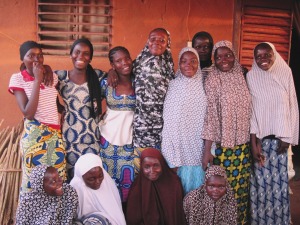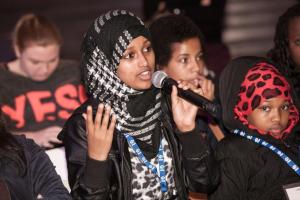“We do not have time for education. Our whole day is consumed in household chores and mostly fetching water…” [i]
Have you ever thought about how water effects your rights? In my daily life in the northern hemisphere I turn on a tap and I have access to water. It is simply there and I do not have to think about it. This has been the case all through my life from the age of being a girl to an adult woman. When I think about water I do not think that it might put me at greater risk of gender based violence. When I was a young girl I did not associate lack of access to water with a potential end to my education, nor did I think that if I was born a girl in a different region of the world it might mean that I would be forced into early marriage.
However, this is not the case for all women and girls across the world. Safe access to clean water is not part of everyday life. Girls are exposed to many rights violations on account of being young and female and this is particularly true when safe access to water is not available close to their homes. Let’s take a closer look at how water impacts the daily life of Rose[ii], a 11 year old girl from Niger in Western Africa…
My name is Rose and I would like to share with you my story about water.
At 5am I need to get up and leave the house to collect the water for the day. This is one of my many daily chores as a girl. Sometimes I feel bad because I am tired from fetching the water, it is heavy and the well near to our hose is often dry so I have to walk to the next village. There is nearly always a long line to collect the water, sometimes this is nice as some of my friends from the next village are there and we get the chance to chat. But sometimes men look at us in a way that makes me feel uncomfortable and unsafe. When this happens I am scared I have heard of other girls who have been caught by these men on the way home.
When I get home I need to wake my brother so he knows he can wash before school. We have breakfast and then we set out on the walk to school. I like to walk with my brother as I feel safe when he is with me. After school my brother stays out in the village with his friends to play. I return to the house to get the pails to fill up with water. When I get home I help my mother to boil the rice and after we eat I use the rest of the water to wash the plates. By the time I sit down to look at my homework I am tired. My brother has finished his and is listening to the radio. I am so tired that I only do some of the work as I find it hard to concentrate. I know I am falling behind in my school and I feel bad about that. My brother helps me with my homework when he can. He also wants me to finish my education; he does not want me to be married off at 13 like some of the other girls in the village. He is very worried about this as they say the drought is coming and when this happened two years ago our uncle did not have enough money to feed everyone in the family so he sent our cousin Faith to be married to a man in another village. She was 14. Faith was very sad as she had to leave her family and leave school but her uncle said they had no choice as the drought meant they had not enough food and water for the family. It was a long time before she came back to our village to visit and when she did she had a little daughter called Hope.
I want to finish school like my brother and would like to have a job one day where I can earn some money and make good choices for my future. I wish we had more wells in our village then I could have more time to work on my homework. When I have to walk long distances to the next villages to get water I wish they had some lights on the roads so I could feel safer in the early morning and late evening. I wish that people looked out for us girls around the wells and on the long walks so that bad things would not happen to us like they have to other girls from our villages. I wish that the long drought will not come and last a long time. I wish not to have the same story as my cousin Faith and have to be married to a man in another village and have a baby when I am still only a young girl. I wish that we always could have safe access to clean water in our village so I could finish my education. More than anything I want an education; it is my path to my future.
Author: Jean Casey is the project coordinator of “The State of the Worlds Girls” report at Plan International.[i] Abdul Shakoor Sindhu “Climate Cha(lle)nge Children: a new perspective on climate change in Pakistan”, Plan Pakistan and RDI. (2012). Quote is from a young girl interviewed in this study.
[ii] Rose is a fictitious character; her story with water is based on the writer’s experience and analysis of interviewing young girls in Niger in November 2012 for the 2013 State of the Worlds girls forthcoming report on Adolescent girls and Emergencies by Plan International.





Recent Comments